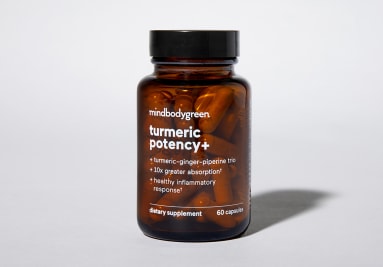5 Underrated Herbs That Can Enhance Your Health, From An MD & Herbal Expert


According to herbal medicine expert Bill Rawls, M.D., author of The Cellular Wellness Solution, we should all add more herbs to our daily routines. "Plants are the best chemists on Earth," he says on this episode of the mindbodygreen podcast, so why not take advantage of their health-promoting phytochemicals?
Although, there are quite a lot of herbs out there, and it can be difficult to know what, exactly, to keep in your herbal arsenal. Not to worry: Below, Rawls offers five of his all-time favorite herbs to have handy. You might be surprised by a few of these underrated players:
Rhodiola
"Rhodiola is a wonderful herb," says Rawls. It's been used for centuries in traditional Chinese and Greek medicine, thanks to its ability to fight stress, enhance athletic performance and energy, and more. "It tends to grow at higher elevations or harsh, cold climates," says Rawls. "When you look at the phytochemistry of an herb, the benefits are often reflecting the plant's natural environment."
Meaning: Rhodiola is really good at protecting itself from physical stressors (like brutal winds), "and it's really great for protecting us against physical stress factors," Rawls notes. "Rhodiola is a really nice herb just for getting you through the day and making you a little more resilient." One clinical trial1 even showed that participants who took Rhodiola rosea every morning were more capable of fighting burnout and maintaining concentration throughout the day.
Reishi mushroom
Up next is reishi mushroom: "If you've ever taken a walk in the woods and happen to see a mushroom that looked kind of like a rust-colored rainbow on the side of a tree, that was probably reishi," Rawls explains. There are multiple species of reishi, but its health benefits have been well documented—in fact, reishi has been recognized as a medicinal mushroom for thousands of years.
"It has been found to have antiviral properties2," adds Rawls, and may even help be protective for your liver3. "It just does all kinds of wonderful things for the body," he says. Here's how to add reishi to your regular routine, if you feel so inclined.
Turmeric
We can go on and on about the benefits of turmeric, but Rawls specifically points out the ancient herb's neuroprotective properties4. Specifically, curcumin (one of the principal bioactive curcuminoid compounds in turmeric root) has been found to have a positive impact on brain-derived neurotrophic factor (BDNF), which supports cognitive function5, learning, memory, and mood.* In a 2019 meta-analysis from Nutrition Research, daily turmeric supplementation over several months (i.e., eight to 12 weeks) was found to significantly increase serum BDNF levels6.*
Milk thistle
"Milk thistle is one that I think is really important to take," says Rawls. "It's really important for protecting the liver." (Quick note: Milk thistle supplements typically utilize the seed, but milk thistle leaves can also be used as a digestive bitter that's helpful for supporting digestion, detoxification, elimination, longevity, and more.)
"As we age, we lose the ability to process toxins [as efficiently] but also manage cholesterol and blood sugar," says Rawls. As it turns out, a healthy liver over the long term is pivotal for effective detoxification, as well as glucose and lipid balance, he explains. A review from Phytocology Research found that silymarin (aka, the phytonutrient bioactive responsible for milk thistle's many benefits in the body) largely supports the liver by protecting it and acting as a toxin blockage agent by inhibiting toxins from binding to liver cells.
Shilajit
Finally, we have shilajit: "It's been recognized for its healing properties in the Himalayas8 for hundreds of years," notes Rawls, and it's rich in minerals. Additionally, "it contains fulvic acid9 and humic acid10, which is really good for the GI tract," Rawls adds.
See, long ago when humans foraged for food, we used to eat a lot of dirt. "When we ate dirt, we also ate bacteria and fermented [microbes] from the soil, so we got a lot of fulvic acid and humic acid. We're not [typically] getting that in our diets anymore," says Rawls. Of course, that's not to say you should start scarfing down some nutrient-rich soil. "Shilajit is a really nice way to replace that," he adds.
The takeaway.
Of course, this list only scratches the surface in terms of all the health-supporting herbs out there. But if Rawls had to highlight a few, he believes these underrated players deserve some airtime. To hear more about Rawls' must-have herbs, be sure to tune in to the full episode or check out the video below!
Enjoy this episode! And don't forget to subscribe to our podcast on iTunes, Google Podcasts, Spotify, or Amazon Music!

Jason Wachob is the Founder and Co-CEO of mindbodygreen and the author of Wellth. He has been featured in the New York Times, Entrepreneur, Fast Company, and Vogue, and has a B.A. in history from Columbia University, where he played varsity basketball for four years.
10 Sources
- https://www.ncbi.nlm.nih.gov/pubmed/19016404
- https://pubmed.ncbi.nlm.nih.gov/10624872/
- https://pubmed.ncbi.nlm.nih.gov/22659462/
- https://www.ncbi.nlm.nih.gov/pmc/articles/PMC7522354/
- https://pubmed.ncbi.nlm.nih.gov/34607976/
- https://pubmed.ncbi.nlm.nih.gov/31279955/
- https://www.ncbi.nlm.nih.gov/pmc/articles/PMC8516555/
- https://www.ncbi.nlm.nih.gov/pmc/articles/PMC3296184/
- https://www.ncbi.nlm.nih.gov/pmc/articles/PMC6151376/
- https://www.ncbi.nlm.nih.gov/pmc/articles/PMC5296205/

